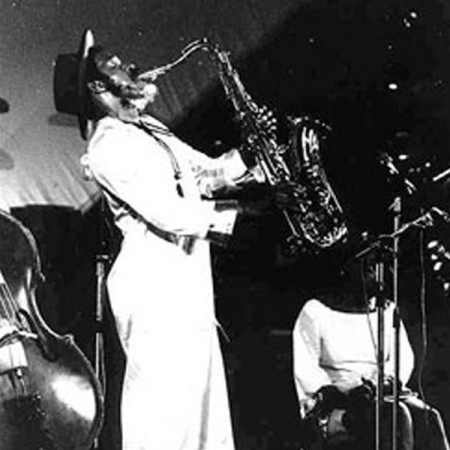
Albert Ayler
In a restaurant-bar in Greenwich Village, tenor saxophonist Albert Ayler was ruminating on the disparity between renown and income. In his case, anyway. Covers of his albums are prominent in the windows of more and more jazz record stores; references to him are increasingly frequent in jazz magazines, here and abroad; a growing number of players are trying to sound like him.
“I’m a new star, according to a magazine in England,” Ayler said, “and I don’t even have fare to England. Record royalties? I never see any. Oh, maybe I’ll get $50 this year. One of my albums, Ghosts, won an award in Europe. And the company didn’t even tell me about that. I had to find out another way.”
All this is said in a soft voice and with a smile but not without controlled exasperation. Bitterness would be too strong a term for the Ayler speaking style. He is concerned with inner peace and tries to avoid letting the economic frustrations of the jazz life corrode him emotionally. It’s not easy to remain calm, but Ayler so far appears to be.
In manner, he is reminiscent of John Lewis of the Modern Jazz Quartet—a gentle exterior with a will of steel, a shy laugh, and a constant measuring of who you are and what you want. Ayler’s younger brother, trumpeter Don, is taller, equally serious, and somewhat less given to smiling.
“I went for a long time without work,” Albert said. “Then George Wein asked me to come to Europe with a group of other people for 11 days starting Nov. 3. I hope to be able to add five or six days on my own after I’m there. Henry Grimes and Sunny Murray will be with Don and me. But before I heard from Wein, I’d stopped practicing for three weeks. I was going through a thing. Here I am in Time, in Vogue, in other places. But no work. My spirits were very low.”
“That’s what they call the testing period,” Don volunteered. “First you get exploited while the music is being examined to see if it has any value. Then when they find there’s an ideology behind it, that there’s substance to it, they’ll accept it as a new form.”
“What is its ideology?” I asked.
“To begin with,” Albert answered, “we are the music we play. And our commitment is to peace, to understanding of life. And we keep trying to purify our music, to purify ourselves, so that we can move ourselves—and those who hear us—to higher levels of peace and understanding. You have to purify and crystallize your sound in order to hypnotize. I’m convinced, you see, that through music, life can be given more meaning. And every kind of music has an influence—either direct or indirect—on the world around it so that after a while the sounds of different types of music go around and bring about psychological changes. And we’re trying to bring about peace. In his way, for example, that’s what Coltrane, too, is trying to do.
“To accomplish this, I must have spiritual men playing with me. Since we are the music we play, our way of life has to be clean or else the music can’t be kept pure.”
This meant, he continued, that he couldn’t work with someone addicted to narcotics or who otherwise is emotionally unstable.
I couldn’t use a man hung up with drugs, because he’d draw from the energy we need to concentrate on the music,” Ayler said. “Fortunately, I’ve never had that problem. I need people who are clear in their minds as well as in their music, people whose thought waves are positive. You must know peace to give peace.”
I asked the brothers about the primary influence on their music.
“Lester Young,” Albert answered. “The way he connected his phrases. The freedom with which he flowed. And his warm tone. When he and Billie Holiday got together, there was so much beauty. These are the kind of people who produce a spiritual truth beyond this civilization. And Bird, of course. I met him in 1955 in Cleveland, where they were calling me ‘Little Bird.’ I saw the spiritual quality in the man. He looked at me, smiled, and shook my hand. It was a warm feeling. I was impressed by the way he—and later, Trane—played the changes.
“There was also Sidney Bechet. I was crazy about him. His tone was unbelievable. It helped me a lot to learn that a man could get that kind of tone. It was hypnotizing—the strength of it, the strength of the vibrato. For me, he represented the true spirit, the full force of life, that many of the older musicians had—like in New Orleans jazz—and which many musicians today don’t have. I hope to bring that spirit back into the music we’re playing.”